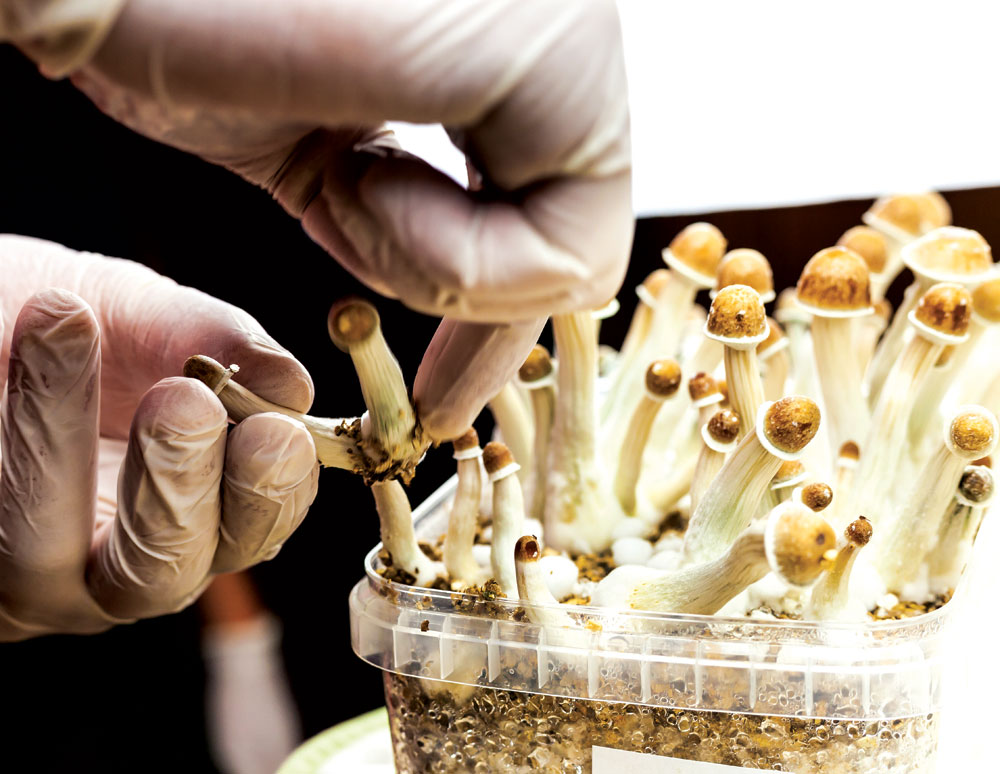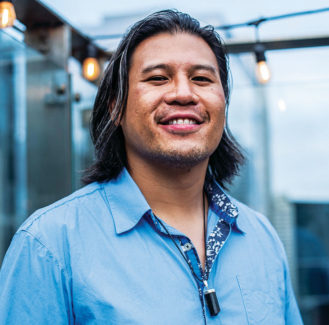
Psilocybin, a natural compound found in some mushrooms, is increasingly being studied and used as a treatment for a variety of mental and physical health ailments, including cluster headaches, PTSD, and treatment-resistant depression. Photo from Shutterstock
Since a car accident two years ago, Charles has suffered an almost-constant headache that varies from mild to severe. “It’s unremitting. I have it almost 24 hours a day, every day. I think about it constantly.” Charles, who asked that we not use his real name, is a tech executive who lives in the Central Park neighborhood. His official diagnosis is post-concussion syndrome, for which there isn’t a clear course of treatment. His neurologist has prescribed anti-depressants, anti-seizure medication, Botox, multiple types of physical therapy, and Ajovy injections—an antibody injection that is used to prevent migraines. He has also tried acupuncture, massage therapy, meditation, mindfulness and varying his work routines, including setting aside a 5-minute rest period every 20 minutes. Nothing has worked. “It came to the point where my neurologist said ‘I don’t think I should keep throwing pills at you.’”
Charles says he spent 5-10 hours a week Googling possible alternative treatments and quickly discovered numerous articles about the benefits of psilocybin—a naturally occurring compound found in some mushrooms that is known for its hallucinogenic properties. Increasingly, it is also being touted as a possible treatment for a variety of physical and mental health maladies including cluster headaches, migraines, PTSD, chronic pain, and treatment-resistant depression.
At the federal level, psilocybin is still illegal to use or sell, although voters in several cities—including Denver—have passed measures to decriminalize its use. This fall another ballot measure will attempt to decriminalize psilocybin statewide. In recent years, research institutions have been given approval to conduct studies about its safety and efficacy in treating physical and mental health conditions.
Charles learned about one such study at Yale University, a very small one, which showed enough promise that the university is now doing a more robust clinical trial. He applied and was accepted into the trial, but ultimately didn’t pursue it because of the risk that he would be given a placebo and because of the costs associated with traveling twice to Connecticut.
Then he discovered the Eleusinia Retreat outside Sayulita, Mexico, which describes itself as a facility “dedicated to the use of psilocybin for both physical and mental well being in a safe, science-oriented environment.” Charles and his wife booked a 5-day retreat and headed to Mexico where they joined a group of 9 others. “This was not a drug glorification retreat. People came for all kinds of reasons. Neurological illnesses I hadn’t heard of. Untreatable depression. People dealing with pain. And one man who had been told he had 90 days to live so he wanted to see if psilocybin could help him deal with his impending death.”
The psilocybin treatment included an Indigenous shaman who conducted a blessing and a cleansing as part of the ritual. Each participant was given 5 grams of mushrooms mixed with honey and then was guided through breathing exercises and a walking meditation. “It was very peaceful. I was overcome with a sense of awe and peacefulness and gratitude.” Charles says his pain was greatly reduced while he was at the retreat. Since returning to work, however, the pain has returned. “I’ve seen a reduction in pain, but it wasn’t a complete cure.” He is unsure about whether he will continue using psilocybin, but is eager to see more scientific research done about its potential health benefits. “Psychedelics have amazing potential. We just have to be wise about how we use them.”
Dr. Neill Epperson, chair of the Department of Psychiatry at the University of Colorado School of Medicine, couldn’t agree more. This winter, she will begin a small clinical study involving 10-20 people to see if psilocybin can provide relief for people who suffer from treatment-resistant depression. “There are people who are really suffering and who are desperate to find treatment. So we want to see if psilocybin works and if so, how it works,” says Epperson. She says the theory is that psilocybin helps to change both the neurotransmitters and the neural plasticity in the brain. “When you are depressed, you ruminate and create pathways in your thought processes over and over again, and it becomes a well-worn route. If you can loosen those synapses and build a new way of thinking, you create a new pathway that is stronger in a more positive way.”
Epperson says psychedelics are a very hot issue in the field of psychiatry right now. “You can’t go to a conference without multiple panels on the topic.” She regrets that for several decades research into psychedelics wasn’t permitted because of passage of the Controlled Substances Act in 1970. “If we had studied these drugs the way we should have in the 70s, 80s, and 90s, we might be in a completely different position now when it comes to treating serious mental illness.”
Epperson’s team will utilize brain imaging technology at the University of Colorado School of Medicine campus and partnerships with companies that are developing psilocybin products to determine the dose
that is most effective for treatment. She is quick to point out that a clinical trial is far different than a person growing their own mushrooms and experimenting. “We are guided by strict regulations from the FDA and it’s done in a very controlled, very safe manner. We have a lot of safeguards in place.”

Jimmy Nguyen co-founded Psychedelic Passage, a national network of guides and trip sitters who facilitate private psilocybin experiences. Photo courtesy of Jimmy Nguyen
Lowry resident Jimmy Nguyen has used psychedelics for 15 years. He isn’t opposed to research centers conducting studies, but he believes there is an important role for non-medical organizations like his to support people who are interested in using psychedelics for recreational, ceremonial, and other healing purposes. Five years ago, he cofounded Psychedelic Passage, which is a network of guides and trip sitters who facilitate in-person psychedelic experiences. “One of the driving forces of our organization is to create a space for private use, for intentional ceremonial healing that can coincide and run parallel with the medical model,” says Nguyen.
He worries that as more legislation is proposed to regulate psychedelic use, it will create a system of “gatekeepers” who will try to limit access. “For example, if there end up being regulations that say psychedelics can only be prescribed by medical professionals, that will help a lot of people, but it will also close the door for a large segment of the population that may not have a qualifying diagnosis.”
Although he is optimistic about the rapidly growing acceptance of psychedelics to be used for healing, he says other purposes shouldn’t be ignored. “Psychedelic medicine is sacred. It can be at the intersection of neuroscience, spirituality, creativity, personal growth or trauma-informed work,” says Nguyen. “But if you relegate it down to just one of those aspects, you miss out on the entire potential that plant medicines have to offer.”


0 Comments